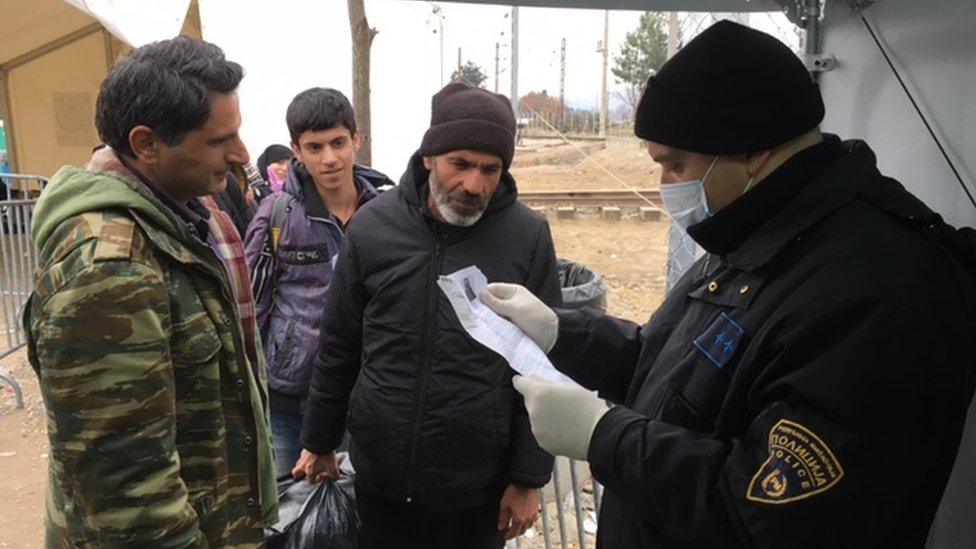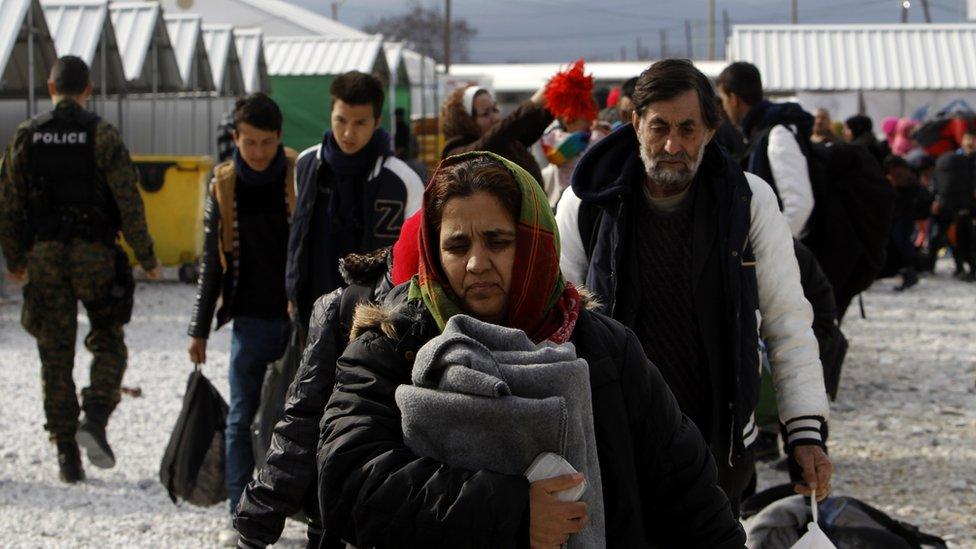Migrant crisis: Macedonia tries to stop flow
- Published

A Macedonian policeman checks the documents of migrants waiting to cross from Greece
On Macedonia's border with Greece, there is just one small crossing-point which thousands of migrants waiting to continue their journey to western Europe can pass through legally.
They line up patiently, waiting their turn, until eventually the Macedonian police officer decides to open the stark metal gate.
He checks their papers: they must be Syrian, Iraqi or Afghan and must have the right stamp on their documents from the Greek authorities, otherwise he will not let them enter Macedonia.
But then after letting some through, the policeman abruptly shuts the gate again.
His Greek counterpart is furious.
She had expected many more to be allowed through, and they had been queuing up in the rain when they could have been keeping warm and dry in their tents.

Refugees often face a long wait before an uncertain onward journey through Europe
The increasing restrictions on this border are sparking fears amongst the refugees and migrants, and aid workers, that the border might eventually be completely closed off.
"The authorities and all the humanitarian organisations that are operating here should have a contingency plan and that is what we are working on at the moment," says Alexandros Voulgaris from the United Nations refugee agency, UNHCR.
"For instance UNHCR has been erecting some family tents so we have more available space in case it is needed."
Amongst those now ensuring this border is fully controlled are teams of foreign police officers from Slovenia, Hungary, Croatia, Slovakia, the Czech Republic and Serbia.
More European Union member states are expected to join the mission soon, working alongside their Macedonian counterparts patrolling the border and providing surveillance equipment, as well as helping to register the migrants.
Richard Galpin reports on a second fence being constructed on the Greece-Macedonia border
"The idea is that our effort in decreasing illegal migration is made in an efficient manner with assistance from these countries," says Macedonia's Foreign Minister, Nikola Poposki.
"And we have estimated we can have 350 to 400 foreign police officers operating on our soil."
Mr Poposki added his government would even consider having foreign troops stationed on the border with Greece if any European countries were to offer this, but apparently this has not been discussed so far.
According to the Macedonian authorities, up to 20,000 migrants were caught crossing illegally into the country between November and January.
Many more migrants are likely to have got through unnoticed.
So now a second razor wire fence is being built by Macedonian troops, running parallel to the original barrier built late last year, which covers some of the most accessible parts of the border.
It adds to the sense that this border is gradually being built up to be a "defensive line" in the increasingly desperate attempt to stem the flow of migrants reaching western Europe this year, after the huge influx in 2015.

EU efforts to persuade Turkey to stop refugees and migrants crossing from its shores to Greece have so far failed.
Since the beginning of January, 84,000 have already made the journey.
Likewise, attempts to persuade Greece to do much more to reduce the onward flow from its territory have also had little impact.
And the next country on the much-used migrant route through the Balkans to western Europe is Macedonia.